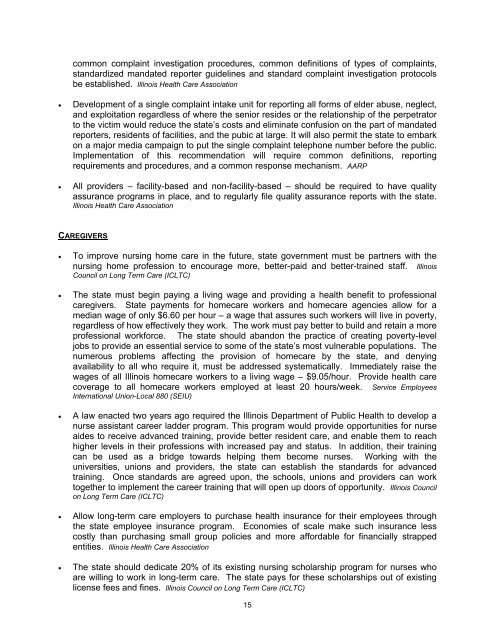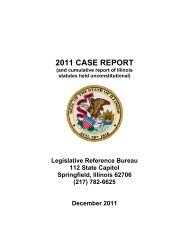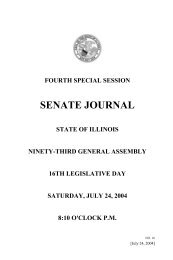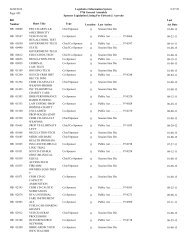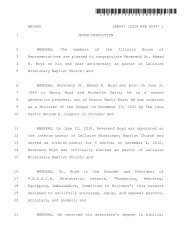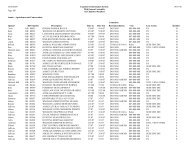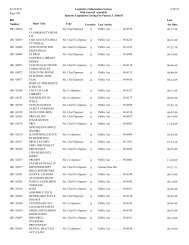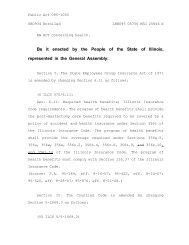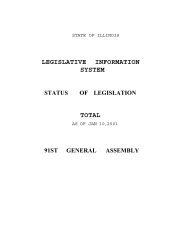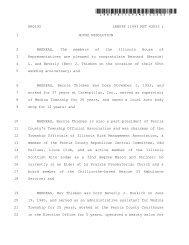Long-Term Care - Illinois General Assembly
Long-Term Care - Illinois General Assembly
Long-Term Care - Illinois General Assembly
Create successful ePaper yourself
Turn your PDF publications into a flip-book with our unique Google optimized e-Paper software.
common complaint investigation procedures, common definitions of types of complaints,<br />
standardized mandated reporter guidelines and standard complaint investigation protocols<br />
be established. <strong>Illinois</strong> Health <strong>Care</strong> Association<br />
• Development of a single complaint intake unit for reporting all forms of elder abuse, neglect,<br />
and exploitation regardless of where the senior resides or the relationship of the perpetrator<br />
to the victim would reduce the state’s costs and eliminate confusion on the part of mandated<br />
reporters, residents of facilities, and the pubic at large. It will also permit the state to embark<br />
on a major media campaign to put the single complaint telephone number before the public.<br />
Implementation of this recommendation will require common definitions, reporting<br />
requirements and procedures, and a common response mechanism. AARP<br />
• All providers – facility-based and non-facility-based – should be required to have quality<br />
assurance programs in place, and to regularly file quality assurance reports with the state.<br />
<strong>Illinois</strong> Health <strong>Care</strong> Association<br />
CAREGIVERS<br />
• To improve nursing home care in the future, state government must be partners with the<br />
nursing home profession to encourage more, better-paid and better-trained staff. <strong>Illinois</strong><br />
Council on <strong>Long</strong> <strong>Term</strong> <strong>Care</strong> (ICLTC)<br />
• The state must begin paying a living wage and providing a health benefit to professional<br />
caregivers. State payments for homecare workers and homecare agencies allow for a<br />
median wage of only $6.60 per hour – a wage that assures such workers will live in poverty,<br />
regardless of how effectively they work. The work must pay better to build and retain a more<br />
professional workforce. The state should abandon the practice of creating poverty-level<br />
jobs to provide an essential service to some of the state’s most vulnerable populations. The<br />
numerous problems affecting the provision of homecare by the state, and denying<br />
availability to all who require it, must be addressed systematically. Immediately raise the<br />
wages of all <strong>Illinois</strong> homecare workers to a living wage – $9.05/hour. Provide health care<br />
coverage to all homecare workers employed at least 20 hours/week. Service Employees<br />
International Union-Local 880 (SEIU)<br />
• A law enacted two years ago required the <strong>Illinois</strong> Department of Public Health to develop a<br />
nurse assistant career ladder program. This program would provide opportunities for nurse<br />
aides to receive advanced training, provide better resident care, and enable them to reach<br />
higher levels in their professions with increased pay and status. In addition, their training<br />
can be used as a bridge towards helping them become nurses. Working with the<br />
universities, unions and providers, the state can establish the standards for advanced<br />
training. Once standards are agreed upon, the schools, unions and providers can work<br />
together to implement the career training that will open up doors of opportunity. <strong>Illinois</strong> Council<br />
on <strong>Long</strong> <strong>Term</strong> <strong>Care</strong> (ICLTC)<br />
• Allow long-term care employers to purchase health insurance for their employees through<br />
the state employee insurance program. Economies of scale make such insurance less<br />
costly than purchasing small group policies and more affordable for financially strapped<br />
entities. <strong>Illinois</strong> Health <strong>Care</strong> Association<br />
• The state should dedicate 20% of its existing nursing scholarship program for nurses who<br />
are willing to work in long-term care. The state pays for these scholarships out of existing<br />
license fees and fines. <strong>Illinois</strong> Council on <strong>Long</strong> <strong>Term</strong> <strong>Care</strong> (ICLTC)<br />
15


